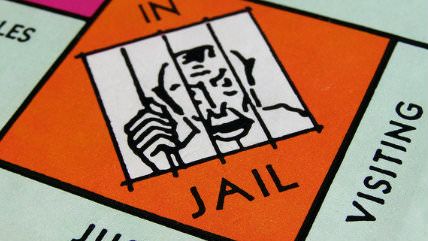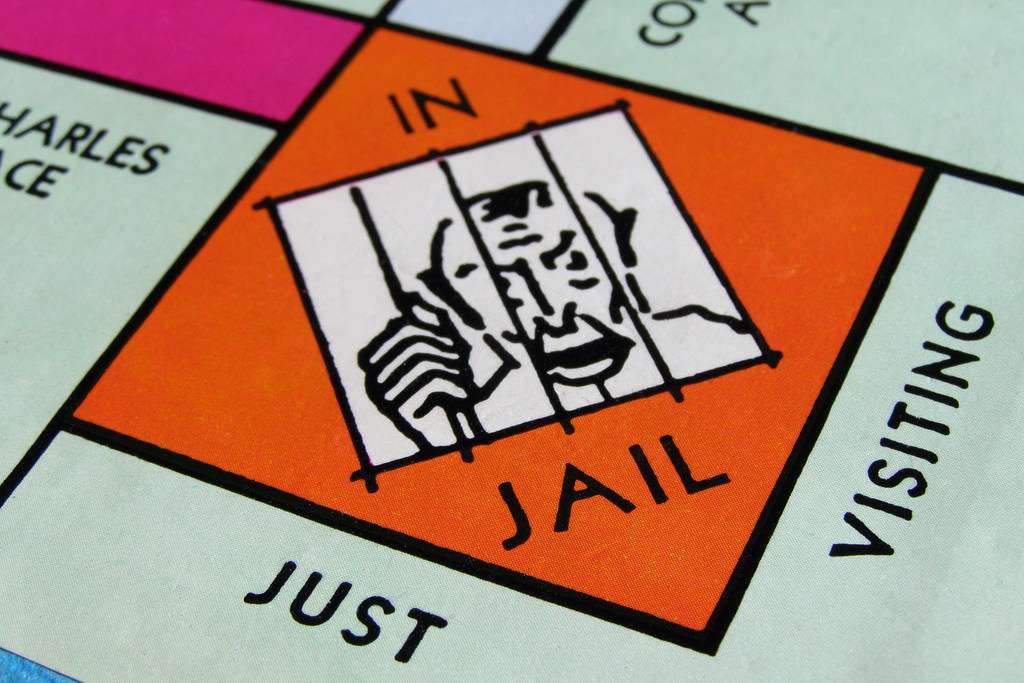Go Directly to Jail—And Then Stay There: How the Misuse of Jails Is Fueling America's Overincarceration
People "are held in jail simply because they are too poor to pay what it costs to get out."


There are more than 3,000 jails in the United States, handling somewhere near 12 million admissions annually. While much of the nascent conversation around criminal justice reform in America has focused on federal and state prisons, a new report from the Vera Institute of Justice serves as a reminder that jails can also be hotbeds of injustice. In "Incarceration's Front Door: The Misuse of Jails in America," the organization argues that jails are one of the chief drivers of problems with our criminal justice system.
Though people often use the terms jail and prison interchangeably, prisons are the state and federal institutions where convicted criminals are sentenced to spend time. Jails are locally run facilities designed largely to hold people who have been arrested while they await arraignment or trial.
"The report's encyclopedic examination of jail use—who's in jail and the myriad paths leading there—is meant to inform," writes Vera Institute President and Director Nicholas Turner in an introduction. "But it should also unnerve and incite us to action. As Vera's president, I observe injustice routinely. Nonetheless even I—as this report came together—was jolted by the extent to which unconvicted people in this country are held in jail simply because they are too poor to pay what it costs to get out."
Jails were originally intended to detain people at length only when those individuals were deemed too dangerous to be released back into the community while awaiting trial or sentencing. But in practice, they have become repositories for all sorts of non-violent offenders who simply can't afford to pay a few hundred dollars to get out.
Turner was "startled" by the number of people detained in jail "for behavior that stems primarily from mental illness, homeless, addiction," or kept for minor violations of the law such as driving with a suspended license or public intoxication. "Even a brief stay in jail can be destructive to individuals, their families, and entire communities," he writes. "Single parents may lose custody of their children, sole wage-earners in families, their jobs—while all of us, the taxpayers, pay for them to stay in jail."
Some facts from the Vera Institute report:
- Today, three-fifths of people in jail are legally presumed innocent.
- Nearly 75 percent of the jail population is there for nonviolent traffic, property, drug, or public order offenses.
- The number of annual jail admissions nearly doubled, from six million in 1983 to 11.7 million in 2013. ("Notably, much of this growth in jail use tracks the rise of drug crime enforcement," the report states.)
- The average length of a jail stay increased from 14 days in 1983 to 23 days in 2013.
- Nearly 15 percent of jailed men and 31 percent of women have a serious mental illness (which includes bipolar disorder, schizophrenia, and major depression), while 68 percent have a history of drug and/or alcohol abuse.
Jails have become "de facto mental hospitals" and detox centers, the Vera Institute warns. This "is at odds with the design, operation, and resources in most jails. Characterized by constant noise, bright lights, an ever-changing population, and an atmosphere of threat and violence, most jails are unlikely to offer any respite for people with mental illness. Coupled with the near-absence of mental health treatment, time in jail is likely to mean further deterioration in their illness."
The vast majority of mentally ill individuals who go to jail do not receive any treatment while there. And while most are jailed for non-violent and non-serious offenses, they wind up locked up for longer than average periods of time. In Los Angeles, for example, mentally ill individuals spent an average of 43 days in jail, compared to 18 days for the general population.
While in jail, individuals can easily accumulate quite a tab for their confinement, as many systems now charge directly for services, from clothing and laundry to functions such as booking to any court-ordered rehabilitative programs required. "For many, these payments are impossible to make," notes the Vera Institute. This then leaves them vulnerable to re-incarceration for failure to pay their criminal justice debt.
Editor's Note: As of February 29, 2024, commenting privileges on reason.com posts are limited to Reason Plus subscribers. Past commenters are grandfathered in for a temporary period. Subscribe here to preserve your ability to comment. Your Reason Plus subscription also gives you an ad-free version of reason.com, along with full access to the digital edition and archives of Reason magazine. We request that comments be civil and on-topic. We do not moderate or assume any responsibility for comments, which are owned by the readers who post them. Comments do not represent the views of reason.com or Reason Foundation. We reserve the right to delete any comment and ban commenters for any reason at any time. Comments may only be edited within 5 minutes of posting. Report abuses.
Please to post comments


Feb. 11, 2015 4:35 pm
Do you hate comments, ENB?
This would have been published earlier but I had to go eat foie gras and talk about robots with KMW & Ron Bailey this afternoon!
(I'm lying, I didn't actually eat any foie gras. But they did.)
Why didn't you eat any foie gras?!? It's fantastic.
(I just ordered some myself from the butcher, when I get it it's blowtorch searing time and then...heaven.)
I don't know, just don't have any desire to try it. (Don't worry, they shamed me for this plenty.)
As they should have. However, in terms of trying it, do you like uni? I find that uni and foie gras have similar mouth feel properties and the way both's flavors spread over your tongue is similar as well. If you like uni you may very well like foie gras.
And now I'll stop pushing the foie gras.
YOU CAN REALLY TASTE THE SUFFERING.
ENB, KMW, and RB, all in the same room. I can only imagine. The only thing missing is Stossel's moustache. And Gillespie's jacket.
But in practice, they have become repositories for all sorts of non-violent offenders who simply can't afford to pay a few hundred dollars to get out.
You want to let them out for free? HOW ARE WE GOING TO PAY FOR ALL THE JAILS?
Our "justice" system is just a mill for fleecing money from people, especially poor people. So this is utterly unsurprising. Pay the blood money or rot in jail, even if it's just a few hundred bucks. Oh, you didn't do anything violent? Fuck you, pay me. You did something no one would ever dream that someone could be incarcerated for (driving without a license, for instance)? Fuck you, pay me. You clearly have mental problems and need help? Fuck you, pay me.
The government is a parasite. And one of its favorite troughs to feed at and suck blood from is the "justice" system.
I would argue that the entire court system operates this way to some degree.
As my never-ending custody battle lurches slowly forward, we are accreting lawyers and therapists and court appointed supervisors and DCF case workers. At this point I think 10 or 11 people all billing at $200+ per hour are involved in the four court cases that I am either a party to or an amicus on.
Some are paid for by the commonwealth, and a depressing number are appointed with the order that "the father shall pay for a maximum of x hours".
My copays alone amount to something like $60 per week. I think by the end of this March, I will have spent something like $20,000 on shrink, legal & court fees over the preceding 12 months for "help".
And if I ever *fail* to pay this shit, I'd be facing a contempt charge.
Don't get me wrong, at this point, more and more of these people are showing signs of being disquieted by my ex's struggles with the basic aspects of parenting children - and I am confident that if I were to drop another $50,000 to pay for their time and attention that they would be getting my ex the mental health treatment/social skills/parenting training she needs. But it seems awfully inefficient.
Oh yes, there is an entire ecosystem of parasites and remoras that swim in the wake of the court system and basically make their living off people being ordered by the court to do various things.
It's so unbelievably corrupt that it should destroy anyone's belief in government or government "justice". No one in it wants justice, they want money or power. Which is normal but as soon as you pretend it isn't about that, people become retarded about thinking that it is.
I wish I could claim to be surprised by this.
This happens because nobody gives a fuck. The casual callous cruelty and bloodlust of people is little changed from the days of public torture and execution at Tyburn.
I had to go eat foie gras and talk about robots
Everybody talks about robots, but nobody does anything about them.
Doom awaits.
Even the "violent" vs "non violent" distinction is dubious, as people will get charged with crimes like assault when something like disturbing the peace would be a closer fit.
This is very interesting:
http://video.pbs.org/program/slavery-another-name/
And it's pretty close to this present-day "debt slavery" ring going on.
my best friend's ex-wife makes $65 an hour on the computer . She has been without a job for seven months but last month her check was $13740 just working on the computer for a few hours. try this..............
????? http://www.netpay20.com